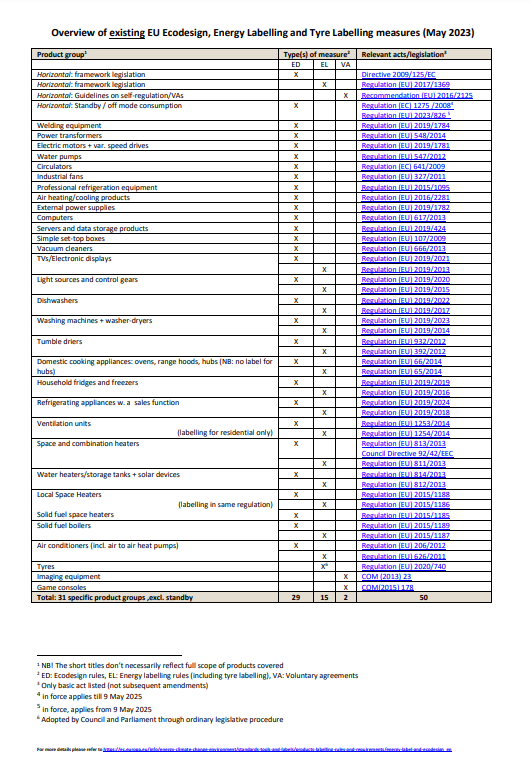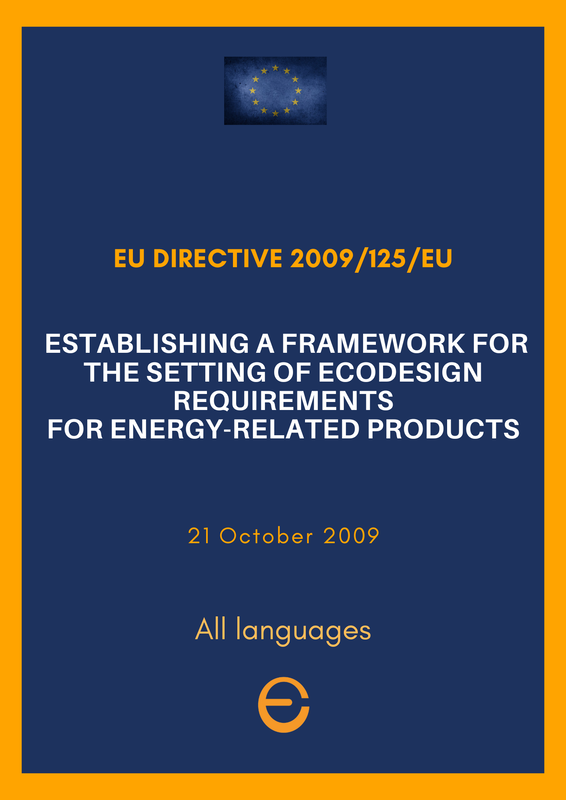Rules and requirements for energy labelling and ecodesign
Ecodesign requirements
|
The ecodesign requirements for individual product groups are created under the EU's Ecodesign Directive in a process coordinated by the European Commission.
The EU legislation on ecodesign is applicable on 31 of the product groups. As an alternative, industry sectors may also sign voluntary agreements to reduce the energy consumption of their products. The Commission formally recognises such agreements and monitors their implementation. The current Ecodesign Directive also establishes a consultation forum to consult stakeholders on the implementation of the directive. T he list of members includes representatives from EU countries, industry and civil society. The group is open for observers from candidates and European Free Trade Association (EFTA) countries, and from organisations that have a legitimate interest in the discussion. |
New Ecodesign in 2023
|
On 30 March 2022, the Commission proposed a new Ecodesign for Sustainable Products Regulation for more environmentally sustainable and circular products. It was published together with the Ecodesign and energy labelling working plan 2022-2024, which covers new energy-related products and updates and increases the ambition for products that are already regulated, as a transitionary measure until the new regulation enters into force.
The Regulation is repealing the Directive 2009/125/EC. On 5 December 2023, the Council and the Parliament have reached a provisional political agreement on the proposed regulation. A vote of the Parliament and Council will follow. The ecodesign regulation would be applicable to almost all categories of products (i.e. dishwashers, televisions, windows, car chargers, etc). It establishes a harmonised framework for setting of requirements for specific product groups to make them not only energy and resource-efficient (as it was the case in the existing 2009 directive) but also more durable, reliable, reusable, upgradable, reparable, recyclable and easier to maintain. The Commission will be able to propose new requirements by delegated acts when new kinds of products or technologies call for it. Energy labelling framework The energy labelling requirements for individual product groups are created under the EU's energy labelling framework regulation, in a process coordinated by the European Commission. 15 of the product groups require an energy label. Companies can create their own labels for energy efficiency using a range of labelling tools. Market surveillance National market surveillance authorities verify whether products sold in the EU follow the requirements laid out in ecodesign and energy labelling regulations. A Commission notice invites national market surveillance authorities to take into account the exceptional circumstances of the COVID-19 pandemic for certain energy labelling and ecodesign requirements. |
Omnibus proposals
A number of ecodesign and energy labelling regulations adopted in 2019 were subsequently modified by “omnibus regulations”:
A number of ecodesign and energy labelling regulations adopted in 2019 were subsequently modified by “omnibus regulations”:
- The ecodesign omnibus is Regulation (EU) 2021/341 amending Regulations (EU) 2019/424, (EU) 2019/1781, (EU) 2019/2019, (EU) 2019/2020, (EU) 2019/2021, (EU) 2019/2022, (EU) 2019/2023 and (EU) 2019/2024 with regard to ecodesign requirements for servers and data storage products, electric motors and variable speed drives, refrigerating appliances, light sources and separate control gears, electronic displays, household dishwashers, household washing machines and household washer-dryers and refrigerating appliances with a direct sales function;
- The energy labelling omnibus is Regulation (EU) 2021/340 amending Delegated Regulations (EU) 2019/2013, (EU) 2019/2014, (EU) 2019/2015, (EU) 2019/2016, (EU) 2019/2017 and (EU) 2019/2018 with regard to energy labelling requirements for electronic displays, household washing machines and household washer-dryers, light sources, refrigerating appliances, household dishwashers, and refrigerating appliances with a direct sales function.
The regulation also aims at facilitating the movement of such products in the Single Market. A new "Digital Product Passport" will provide information about products' environmental sustainability. It will help consumers and businesses to make informed choices when purchasing products and help public authorities to better perform checks and controls. The proposal also establishes provisions regarding transparency and prevention of destruction of unsold consumer products.




